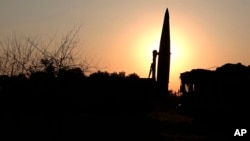Russian President Vladimir Putin claimed on Dec. 16 that recent changes in Moscow’s nuclear doctrine along with the Kremlin’s ever increasing nuclear rhetoric are "no nuclear saber-rattling" but merely a deterrence policy. Speaking at the Russian defense ministry’s meeting, Putin assessed Russia’s conduct in the Ukraine war and shared insights on the nation’s nuclear posture.
He repeated a well-worn propaganda narrative to portray Moscow’s military aggression against Ukraine as "defending Motherland" and claimed that the whole of Russia is committed to giving their lives "for the sake of victory and the Fatherland."
Moving on to a nuclear topic, Putin claimed that the "collective West," and specifically the United States’ support for Ukraine, prompted him to pump up Russia’s nuclear arsenal and amend the constitution to loosen legal restrictions on Moscow’s use of nuclear weapons. All those actions are merely defensive, Putin said:
"Let me stress once again, so that no one accuses us of nuclear saber-rattling: This is a policy of nuclear deterrence."
That is misleading.
Threatening the use of nuclear weapons has been an integral part of Russia’s hybrid war strategies dating back to the Cold War era, long before the Kremlin launched its clandestine operation in 2014 to annex Crimea and destabilize eastern Ukraine.
Moscow’s nuclear rhetoric only intensified after Russia invaded Ukraine in February 2022.
The VOA Fact Check team reviewed nuclear threats voiced publicly by top Russian officials since the start of Moscow’s full-fledged war in Ukraine.
The resulting database includes 135 statements made between Feb. 24, 2022, and Dec. 17, 2024, ranging from a vague promise of looming "nuclear apocalypses" by Russia’s ex-president Dmitry Medvedev, to threats against Ukraine, the United States and Europe vowing to turn their cities "into radioactive ash."
Vladimir Putin made 27 of these 135 nuclear threats, with the number of statements increasing each year: five in 2022, nine in 2023, and 13 in 2024.
On the day of the Ukraine invasion, Feb. 24, 2022, Putin addressed the Russian nation and the outside world with an assurance that "Russia remains one of the most powerful nuclear states." He warned that "there should be no doubt" that "any potential aggressor will face defeat, and ominous consequences should it directly attack our country."
In September, he threatened to "of course, use" nuclear weapons, in response to a "nuclear blackmailing" and threats to Russia’s "territorial integrity," claiming that "This is not a bluff." In December, Putin revealed he was considering changing Russia’s military doctrine to allow "preventive disarming nuclear strikes" against potential enemies.
Four of his nine nuclear threats in 2023 Putin made in February, starting on Feb. 2 with a promise to nuke Germany, if Berlin sent its Leopard battle tanks to Ukraine (which Germany did send a month later). On Feb. 23, Putin ordered the Russian nuclear forces to simulate a scenario in which Russia strikes Ukraine with nuclear weapons to assess the effects and consequences of such an attack.
Most of the remaining nuclear weapons-related statements that year Putin dedicated to justifying the transfer of nuclear weapons systems to Belarus.
Of the 13 nuclear threats from Putin in 2024, a few had significant impact, including the U.S. warning to Russia on Feb. 14 not to deploy nuclear weapons in space.
Then on Feb. 29, Putin told the Russian Federation Council, that the nation’s strategic nuclear forces "are in a state of full combat readiness for a guaranteed use."
On March 13, the CEO of MIA Rossia Segodnya state media giant Dmitry Kiselyev asked Putin in a televised interview whether Russia was ready for a nuclear war. "Weapons exist to be used," Putin answered "... including the ones you just mentioned … if it is about the existence of the Russian state, about harming our sovereignty and independence."
On Dec. 16, Putin ordered the Russian nuclear forces "to remain in a constant combat readiness," while also claiming his acts and rhetoric have nothing to do with a nuclear saber rattling but part of Russia’s nuclear deterrence policy.
Russia continues to rely on nuclear saber-rattling because it is getting away with it, Heather Williams, director of the Project on Nuclear Issues at the Center for Strategic and International Studies in Washington, D.C., wrote in May.
"Holding Russia accountable for raising the risk of nuclear use and breaking down nuclear guardrails will not only uphold norms but also deter Russia from continuing with its irresponsible behavior," Williams said.





